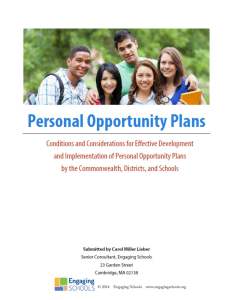September 22, 2014 | Advisory Plus | Blog
With support from the Nellie Mae Education Foundation and the Schott Foundation for Public Education, we’re delighted to share our new research paper, “Conditions and Considerations for Effective Development and Implementation of Personal Opportunity Plans by the Commonwealth, Districts, and Schools,” by Engaging Schools senior consultant Carol Miller Lieber. “Personal Opportunity Plans” contributes to the movement to shift from standards-based to supports-based reform that provides necessary resources so that every student has the opportunity to learn, succeed in school, and craft a productive future with the support of counselors, teachers, and personal advocates.
What is a personal opportunity plan (or POP, as it’s commonly abbreviated)? A POP is an ongoing, student-centered, student-directed process aligned with a set of documents that maximizes students’ academic, personal, and college and career development and fosters success in school and life. The essential components of a POP are academic advising; personal development; intensive career and college exploration, planning, and preparation; and developmental postsecondary readiness skills and mindsets.
 “Personal Opportunity Plans” shares both what POPs look like in practice and the conditions that will best favor their successful implementation. The paper covers a lot of ground, including:
“Personal Opportunity Plans” shares both what POPs look like in practice and the conditions that will best favor their successful implementation. The paper covers a lot of ground, including:> A case study of a ninth-grader experiencing the POPs process
> An examination of the beliefs that support POPs
> An analysis of the flexible personnel structure needed to deliver POPs
> The format, activities, documents, and data that drive the POPs process
> Necessary scheduling accommodations, staff communication habits, professional learning, assessment, and definition of roles and responsibilities
> A look at effective advisories, which are the basis for effective POPs implementation
> Supporting research and resources
You can download “Personal Opportunity Plans” as an executive summary and full version.
- Topics
- Advisory Plus (3)
- Annual Reports (1)
- Blog (64)
- Conferences (3)
- Countering Bullying and Harassment (4)
- Development (1)
- District Codes of Character, Conduct, and Support (2)
- Engaged Classrooms (13)
- Engaging Schools (12)
- Publications (10)
- Research (5)
- Schoolwide Discipline and Student Support (23)
- Social and emotional learning (10)
Twitter Feed





